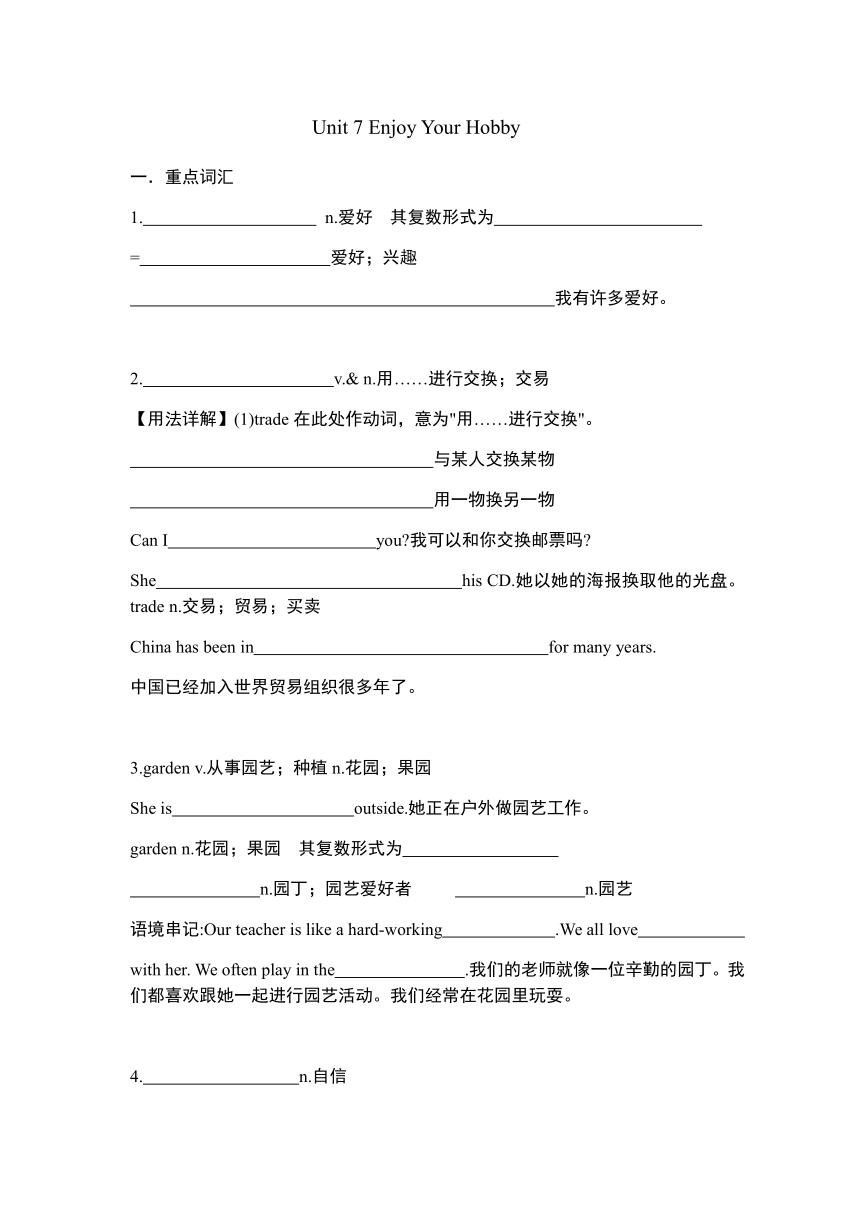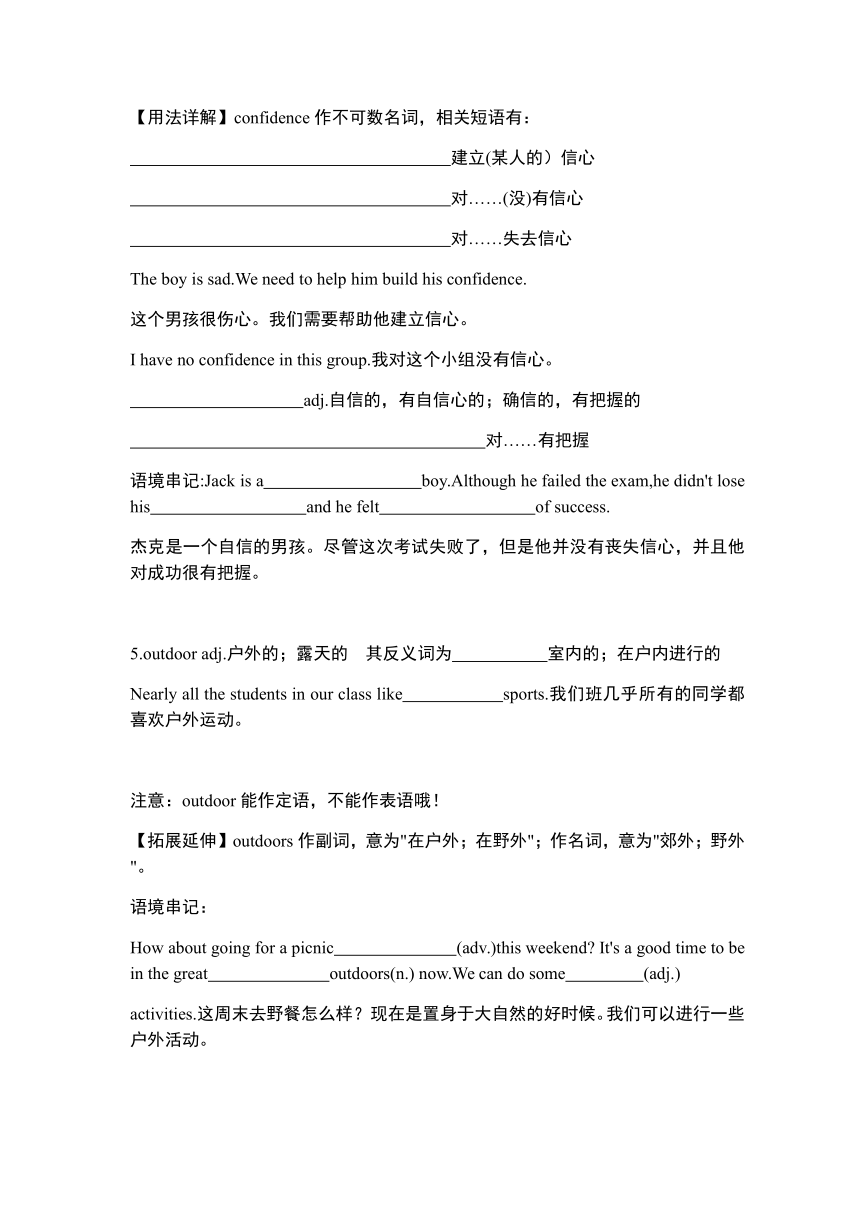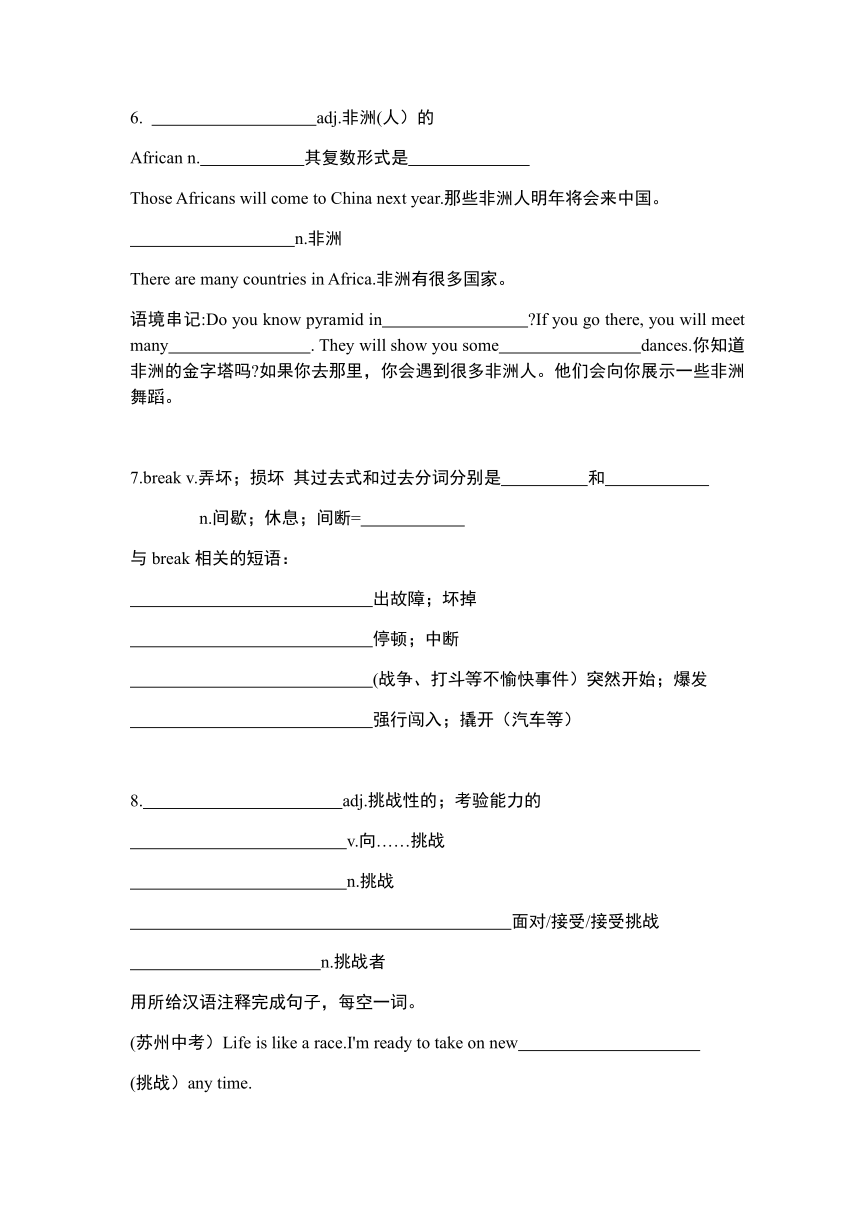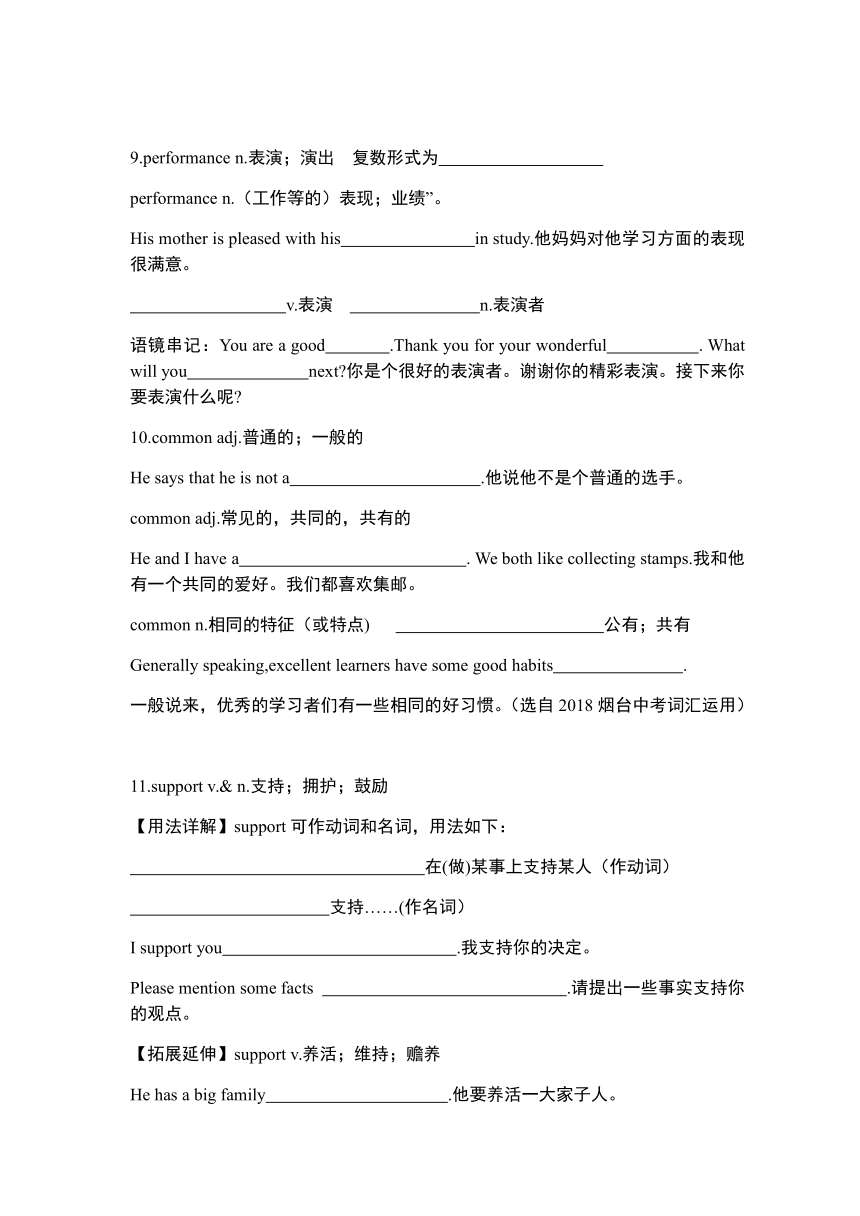冀教版英语八年级上册Unit 7 Enjoy Your Hobby知识点详解
文档属性
| 名称 | 冀教版英语八年级上册Unit 7 Enjoy Your Hobby知识点详解 |

|
|
| 格式 | docx | ||
| 文件大小 | 40.4KB | ||
| 资源类型 | 教案 | ||
| 版本资源 | 冀教版 | ||
| 科目 | 英语 | ||
| 更新时间 | 2021-01-02 00:00:00 | ||
图片预览





文档简介
Unit 7 Enjoy Your Hobby
重点词汇
1. n.爱好 其复数形式为
= 爱好;兴趣
我有许多爱好。
2. v.& n.用……进行交换;交易
【用法详解】(1)trade在此处作动词,意为"用……进行交换"。
与某人交换某物
用一物换另一物
Can I you?我可以和你交换邮票吗?
She his CD.她以她的海报换取他的光盘。trade n.交易;贸易;买卖
China has been in for many years.
中国已经加入世界贸易组织很多年了。
3.garden v.从事园艺;种植n.花园;果园
She is outside.她正在户外做园艺工作。
garden n.花园;果园 其复数形式为
n.园丁;园艺爱好者 n.园艺
语境串记:Our teacher is like a hard-working .We all love
with her. We often play in the .我们的老师就像一位辛勤的园丁。我们都喜欢跟她一起进行园艺活动。我们经常在花园里玩耍。
4. n.自信
【用法详解】confidence作不可数名词,相关短语有:
建立(某人的)信心
对……(没)有信心
对……失去信心
The boy is sad.We need to help him build his confidence.
这个男孩很伤心。我们需要帮助他建立信心。
I have no confidence in this group.我对这个小组没有信心。
adj.自信的,有自信心的;确信的,有把握的
对……有把握
语境串记:Jack is a boy.Although he failed the exam,he didn't lose his and he felt of success.
杰克是一个自信的男孩。尽管这次考试失败了,但是他并没有丧失信心,并且他对成功很有把握。
5.outdoor adj.户外的;露天的 其反义词为 室内的;在户内进行的
Nearly all the students in our class like sports.我们班几乎所有的同学都喜欢户外运动。
注意:outdoor能作定语,不能作表语哦!
【拓展延伸】outdoors作副词,意为"在户外;在野外";作名词,意为"郊外;野外"。
语境串记:
How about going for a picnic (adv.)this weekend? It's a good time to be in the great outdoors(n.) now.We can do some (adj.)
activities.这周末去野餐怎么样?现在是置身于大自然的好时候。我们可以进行一些户外活动。
adj.非洲(人)的
African n. 其复数形式是
Those Africans will come to China next year.那些非洲人明年将会来中国。
n.非洲
There are many countries in Africa.非洲有很多国家。
语境串记:Do you know pyramid in ?If you go there, you will meet many . They will show you some dances.你知道非洲的金字塔吗?如果你去那里,你会遇到很多非洲人。他们会向你展示一些非洲舞蹈。
7.break v.弄坏;损坏 其过去式和过去分词分别是 和
n.间歇;休息;间断=
与break相关的短语:
出故障;坏掉
停顿;中断
(战争、打斗等不愉快事件)突然开始;爆发
强行闯入;撬开(汽车等)
8. adj.挑战性的;考验能力的
v.向……挑战
n.挑战
面对/接受/接受挑战
n.挑战者
用所给汉语注释完成句子,每空一词。
(苏州中考)Life is like a race.I'm ready to take on new
(挑战)any time.
9.performance n.表演;演出 复数形式为
performance n.(工作等的)表现;业绩”。
His mother is pleased with his in study.他妈妈对他学习方面的表现很满意。
v.表演 n.表演者
语镜串记:You are a good .Thank you for your wonderful . What will you next?你是个很好的表演者。谢谢你的精彩表演。接下来你要表演什么呢?
10.common adj.普通的;一般的
He says that he is not a .他说他不是个普通的选手。
common adj.常见的,共同的,共有的
He and I have a . We both like collecting stamps.我和他有一个共同的爱好。我们都喜欢集邮。
common n.相同的特征(或特点) 公有;共有
Generally speaking,excellent learners have some good habits .
一般说来,优秀的学习者们有一些相同的好习惯。(选自2018烟台中考词汇运用)
11.support v.& n.支持;拥护;鼓励
【用法详解】support可作动词和名词,用法如下:
在(做)某事上支持某人(作动词)
支持……(作名词)
I support you .我支持你的决定。
Please mention some facts .请提出一些事实支持你的观点。
【拓展延伸】support v.养活;维持;赡养
He has a big family .他要养活一大家子人。
典例:A true friend always you whenever you are in trouble.
A. punishes B.controls
C.praises D.supports
12.real adj.真正的;确实的 adv.真正地;的确
【易混辨析】real与true
①real“真正的;真实的”,指事实上(客观上)存在的,而不是想象的。
These are pictures of .这些是现实中的动物图片。
②true“确实的;真正的”,强调与实际情况相符,与”虚假的”对应。
The news .这则新闻是真实的。
daily adv.每日;每天=
I work hard at school .我每天在学校努力学习。
daily adj.每日的;日常的
n.(除星期日外每日发行的)日报 如China Daily《中国日报》。
根据所给提示完成句子。(2018·宿迁中考)
According to a survey,the average number of (日常的)steps of people across the world is 4,961.
14.instead adv.代替;反而;却
【易混辨析】instead与instead of
①instead副词,意为“代替;反而;却”,常位于句首或句末。位于句首时,其后常用逗号与后面的句子隔开。
②instead of介词短语,意为“代替……;而不是……”,常位于句中,后跟名词、代词或动名词作宾语。
He didn't go shopping. ,he went to watch a movie.他没有去购物。相反,他去看了电影。
Lee was ill so I went .李病了,所以我反而去了。
It was rainy yesterday. We watched TV flying kites outside.昨天下雨了。我们看电视了,而没有去外面放风筝。
二.重点短语
1. 在某人的空闲时间=
spare在此处作 ,意为 ,one's通常是形容词性物主代词或名词所有格。
【拓展延伸】spare还可作 ,意为
目前我抽不出时间去度假。
2. v.收集;集合
He has collected lots of old coins in the past years.他在过去的几年里收集了很多古币。
n.收集者,收藏家
n.收藏品;一批物品,一群人
一堆 ………
语境串记:The old man is a . He likes all kinds of bottles. The large of the bottles is very important to him.这个老人是一个收集者。他喜欢收集各种各样的瓶子。这一大堆瓶子对他来说很重要。
3. 对……感兴趣= 其中in是介词,后接名词、代词或动名词作宾语。
I don't like poems,but I am interested in stories.我不喜欢诗,但是我对故事感兴趣。
My sister books.我的妹妹对读书感兴趣。
(哈尔滨中考)Calligraphy(书法)is a traditional Chinese art.More and more kids are becoming in it.
A.interest
B. interested
C.interesting
各种各样的,kind在此处表示”种类”,
常见短语有: 一种
不同种类的
Jack likes to eat all kinds of delicious food.杰克喜欢吃各种各样的美食。
The tiger is a kind of animal.老虎是一种 动物。
coats in our shop.
我们店里有很多不同种类的外套。
【拓展延伸】kind of ,后接形容词。
I'm listening to a CD ,but it is boring.我正在听CD,但是它有点无聊。(选自2018益阳中考完成对话)
开始从事,后面接名词、代词或动名词作宾语。
He took up when he was 20 years old. 他在20岁时开始从事写作。
把……当作一种爱好
He takes up collecting stamps as a hobby.他把集邮当作一种爱好。
take up
This table too much place.这张桌子太占地方了。
【拓展延伸】与take相关的其他常见短语:
轮流
记下
照料;照顾
欺骗;留宿
参加
起飞;脱下
(莱芜中考)The minute Nancy saw paper cutting,she fell in love with it and
as a hobby.
A. picked it up B. looked it up
C. took it up D. cheered it up
感到骄傲=
为……感到骄傲/自豪
这对父母为他们的儿子感到骄傲。
为做某事而骄傲/自豪
I'm proud .我很自豪能获得一等奖。
n.骄傲;自豪相关短语有:
为……感到骄傲/自豪
=
.她为她的孩子们取得的成就感到非常自豪。
值得自豪的人(或事物)
根据所给的中文意思完成句子,每空一词。
(2018·达州中考)亲爱的爸爸妈妈,不要为我担心,你们将因为我而骄傲的。我永远爱你们。
Dear mom and dad,don't worry about me.You will of me.I love you forever.
7.do a report做报告
做有关……的报告
为某人做报告
It's my turn to give a report.I feel so nervous.轮到我做报告了,我感到很紧张。
report v.
向某人汇报/告发某事
It's reported that...
我将这次事故报告给了警察。
8. =
动词send后有两个宾语,我们称之为"双宾语",其中,物(sth.)被称为"直接宾语",人(sb.)被称为"间接宾语”。当直接宾语为代词时,只能使用send sth.to sb.结构。
= (give )把某物给某人
= 为某人买某物
= 把某物借给某人
= 向某人展示某物
= 为某人选择某物
= 向某人提供某物
= 为某人做某物
9.require v.要求;需求
需要某物
要求某人做某事
老师要求我们按时完成作业。
被要求做某事
所有的学生都被要求参加这项活动。
要求某人做……
10.be made of...由………做成
由……做成,后接生产材料,尤指产品能看出原材料。
由……做成,后接生产材料,指产品不能看出原材料。
在……生产,后接产地,也可接生产时间。
由……制造,后接生产者。
由……组成,后接构成整体的各部分。
语境串记:My breakfast three parts. It is
my mother.Salad fresh fruit and vegetables,cheese is
milk,and bread Shanghai. They are so delicious.我的早餐由三部分组成,它是我妈妈做的。沙拉是用新鲜水果
和蔬莱做的,奶酪是用牛奶做的,面包产自上海。它们很美味。
(宿迁中考)Your gloves should be made leather,for they feel soft and smooth.
A.in B.on
C.for D.of
11. 处置,处理;相处=
do with 常与 连用,deal with 常与 连用
? = ?你用那笔钱做什么了?
.=
.
我不知道如何处理这个问题。
12. 上上下下;来回;往复;起伏
13.put...on its side将……沿侧面放
【拓展延伸】与side相关的其他短语:
左右来回(摇摆)
站在某人一边;和某人观点一致
并排;并肩地
14.① 后接sth./doing sth.,侧重指参加某项活动并在活动中起一定作用。
② 后接sb./sth.,侧重指加入某人或某个组织,成为其中一员。
③ 后接sth./doing sth.,侧重指参加小规模的活动,常用于日常口语。
语境串记:In order to improve my spoken English,I an English club last month and I many activities. Luckily,I got the chance to the English speech competition in our school. I was so happy.为了提高我的英语口语,上个月我加入了一个英语俱乐部,并且参加了很多活动。幸运的是,我得到了参加我们学校英语演讲比赛的机会。我非常开心。
(贵港中考)-I'm going to Hong Kong next month.What about you,Jenny?
-I will social practice.
A.take part in B.take place
C. take off D.take action
15. 过去常常做某事
Years ago, sending letters the most important way to communicate with other people.许多年前寄信常常是与他人交流的最重要的方式。
= 被用来做某事
Pens write with.笔是用来写字的。
The wood making paper.木材被用来造纸。
习惯于(做)某事
They in the countryside.他们习惯于住在村。
(泰州中考)Diana used to work,but now she is used to
because the road is crowded and she wants to keep fit.
A.drive;walking B.drive;walk
C.driving;walk D.driving;walking
词汇精练
I.把下列基本词组英汉互译。
1. 在某人的空闲时间_____________ 2.寻找______________________
3. 与某人交换某物______________ 4. 各种各样的____________________
5. take up______________ 6. some more ____________________
7. up and down ______________ 8.put…on its side _____________________
9. parking lot______________ 10. pay sb. a visit _______________
II.根据汉语提示填空。
1.I want a ________ (休息)from university life.
2.The elephant is the biggest animal on _______(陆地).
3.This is a _______ (普通的)everyday expression.
4.His ________ (真实的)name is ZhaoKai.
5.Tom usually goes to school by bike ________ (而不是)of on foot.
III. 用所给词的适当形式填空。
1.My hobby is ________(collect) all kinds of tickets.
2.That’s an old saying, and it is _________(truth).
3.Maybe he ______(live) in this village.
4.All the students ________ (real) enjoy my hobby.
5.The boy ________ (break) a cup this morning.
IV.从方框中选择适当单词填空。
support, daily, instead, else, collection
_______, she is good at singing.
His ______ work is to hand out newspaper.
There are a lot of different ________ in his room.
We need to ___________ our teachers.
Is there anything ________?
参考答案
I.把下列基本词组英汉互译。
1.in one’s free/spare time 2. look for 3.trade sth. with sb.
4.all kinds of 5.开始从事 6. 再来一些 7. 上上下下、来来回回
8.将……沿侧面放 9.停车场 10.看望某人
II.根据汉语提示填空。
1.break 2.land 3.common 4.real 5.instead
III.用单词的适当形式填空。
collecting 2.true 3.lives/lived 4.really 5.broke
IV.从方框中选择适当单词填空。
Instead 2. daily 3. collection 4.support 5. else
三.重点句型和语法
1.(1)Exercising is fun, and it also helps to keep us healthy.运动很有趣,而且它也
有助于我们保持健康。(教材P98)
(2)My hobby is studying stars.我的爱好是研究恒星。(教材P98)
①动词-ing(短语)的用法
【用法详解】(1)动词-ing Exercising在①句中作主语。当单个动词-ing(短语)作主语时,谓语动词应用单数形式。
我的爱好是读书。
(2)动词-ing短语 studying stars 在②句中作表语。动词-ing(短语)可用在系动词后面作表语,表示主语的内容。
我的工作是教英语。
【拓展延伸】动词-ing(短语)除了在句子中作主语、表语外,还可以作宾语或定语。
①在谓语动词或介词后面作宾语
她妹妹非常喜欢唱歌。
Bob is interested in playing basketball.鲍勃对打篮球感兴趣。
②修饰名词,单个动词-ing作定语时多位于名词前面
I will this afternoon.我今天下午要去上游泳课。
【考向点拨】动词-ing(短语)作主语在中考中通常以选择题或动词填空的形式进行考查。学生要熟记动词-ing(短语)作主语时谓语动词用单数形式,并能熟练地将动词转化为动词-ing形式。
(2018·永州中考)Playing computer games too often bad for us.
am B.is C.are
2.I find it very interesting.我发现它很有趣。(教材P98)
【句式剖析】
I find it very interesting.
【用法详解】在该结构中,find意为”发现……处于某种状态",充当宾补的通常是名词(短语)、形容词(短语)、介词短语等。
I found Beijing .我发现北京是一座美丽的城市。(名词短语作宾补)
I found your bedroom when I came in.当我进来的时候,我发现你的卧室非常干净。(形容词作宾补)
When she woke up,she found herself .她醒来时发现自己在医院。(介词短语作宾补)
【拓展延伸】"find+it+形容词/名词(短语)+ to do sth."意为”发现或了解到做某事……",其中it为形式宾语,后面的 为真正的宾语。
.我发现每天锻炼非常重要。
典例2:根据汉语及动词提示,用相关的动词短语完成句子。
(黄冈中考)当你到达山顶时,你会发现吸入空气很困难。
When you reach the top of the mountain, you'll find it difficult
air.(take)
3.A hobby is not only fun but also useful.爱好不仅有趣而且有用。(教材P100)
not only...but also...不仅……而且……
【用法详解】not only...but also...连接两个并列成分,重在强调后者,also有时可以省略。当连接两个并列主语时,谓语动词的单复数形式遵循"就近原则”,即谓语动词和离它最近的主语在人称和数上保持一致。
Warm words can touch not only your heart but(also) mine.暖心的话不仅能打动你的心,也能打动我的心。(选自2018孝感中考单项选择)
Not only my sister but also my friends outside.不仅我妹妹,我的朋友们也想出去玩。
Not only my friends but also my sister outside.不仅我的朋友们,我的妹妹也想出去玩。
【拓展延伸】在主谓一致方面,遵循”就近原则”的句型和结构还有:there be句型,neither...nor...(既不……也不……),either...or...(或者……或者………)等。
(2019·广元中考)Not only you but also I interested in the cartoon called Peppa Pig.
A.am
B.is
C.are
4.It's never too late to learn something new.学习新东西永远都不晚。(教材P100)形容词修饰复合不定代词
【用法详解】something new"新的东西",属于"复合不定代词+形容词"结构。形容词修饰 something,anything,someone,anyone等复合不定代词时,要放在
复合不定代词的后面,作后置定语。
Is there anything interesting in today's newspaper?今天报纸上有什么有趣的新闻吗?
【拓展延伸】形容词修饰 somewhere,anywhere,everywhere等时也要后置。
.
今年夏天我想去凉爽的地方度假。
(齐齐哈尔中考)-Would you like to eat?
-Yes,please.
A. anything delicious
B. delicious anything
C.something delicious
5.Finally,it's Danny's turn.最后,轮到丹尼了。(教材P106)
It's one's turn(to do sth.).轮到某人(做某事)了。
【用法详解】It's one's turn(to do sth.)意为"轮到某人(做某事)了",turn在此处作 ,意为"(依次轮到的)机会”。
.轮到李明打扫教室了。
【拓展延伸】与turn相关的短语还有:
轮流/依次(做某事)
We should take turns to .我们应该轮流做家务。
轮流,交替
The book is,by turns,funny and very sad.这本书时而
妙趣横生,时而悲悲戚戚。
不按顺序地;次序混乱地
No one is allowed to get his ticket .任何人都不准不按次序买票。
6.So did most of our classmates!我们的大多数同班同学也参加了!(教材P108)
so+be/助动词/情态动词+主语
【用法详解】该句型为肯定形式的倒装结构,意为”……也是”,表示前面叙述的肯定情况也适用于后者,而且前后主语不是同一个人或物。
Lucy is good at singing and .露西擅长唱歌,莉莉也是。
Tom watched TV yesterday and .汤姆昨天看了电视,詹妮也看了。
【拓展延伸】如果表示前面叙述的否定情况也适用于后者,则要用否定倒装结构"neither/nor+ be/助动词/情态动词+主语”,且前后主语也不是同一个人或物。
-Mary will not go swimming tomorrow.玛丽明天不去游泳。
- I.我也不去。
He has never been to Beijing. .
他从未去过北京,她也没去过。
【易混辨析】
①so+be/助动词/情态动词+主语 表示……也是”,前后主语是不同的人或物。
He can swim. .他会游泳,我也会。
②so+主语+be/助动词/情态动词 “……的确如此”,前后主语是同一人或物。
—He can swim.他会游泳。
— .的确如此。
例6:(黔东南州中考)-Sandy likes English best.She reads the texts every day.
— .
A.So does Jim B.So Jim does
C.So Jim is D.So is Jim
句式精练
I.句型转换。
1. He used to be my best friend.(改为一般疑问句)
_______ he ______ to be your best friend?
2.How about going to the park? (改为同义句)
________ _______ go to the park?
3.She is a very clever girl.(改为感叹句句)
_______ _______ the girl is!
4.He gets up so early daily.(改为同义句)
He gets up so early ______ _______.
5.The hall was filled with people. (改为同义句)
The hall _______ _______ ________ people.
II.完成句子,每空一词。
他过去常常说他没时间。
He ________ ________ say that he was too busy.
多漂亮的花啊!
_________ __________ _________ they are!
这个房子是石头做的。
This house is ________ ________ stone.
4.他上上下下打量着这个陌生人。
He is looking the strange man _________ _______ _______.
5.活到老,学到老。
It’s ________ ________ old ________ learn.
III. 连词成句。
1.take,I,home,it,my,add,to,collection,and,it
________________________________________
2.me,more,can,some,you,help
________________________________________
3.built,I,one,them,of,myself
________________________________________
4.it,easy,learn,is,to,me,for
________________________________________
5.tried,my,dad,it,find,to
________________________________________
参考答案
I.句型转换。
1.Did; use
2.Why not
3.How clever
4.every day
5.was full of
完成句子,每空一词。
1. used to 2. What beautiful flowers 3. made of
4.up and down 5. never too; to
III.连词成句。
1.I take it home and add it to my collection.
2.Can you help me some more?
3.I built one of them myself.
4.Is it easy for me to learn?
5.My dad tried to find it.
重点词汇
1. n.爱好 其复数形式为
= 爱好;兴趣
我有许多爱好。
2. v.& n.用……进行交换;交易
【用法详解】(1)trade在此处作动词,意为"用……进行交换"。
与某人交换某物
用一物换另一物
Can I you?我可以和你交换邮票吗?
She his CD.她以她的海报换取他的光盘。trade n.交易;贸易;买卖
China has been in for many years.
中国已经加入世界贸易组织很多年了。
3.garden v.从事园艺;种植n.花园;果园
She is outside.她正在户外做园艺工作。
garden n.花园;果园 其复数形式为
n.园丁;园艺爱好者 n.园艺
语境串记:Our teacher is like a hard-working .We all love
with her. We often play in the .我们的老师就像一位辛勤的园丁。我们都喜欢跟她一起进行园艺活动。我们经常在花园里玩耍。
4. n.自信
【用法详解】confidence作不可数名词,相关短语有:
建立(某人的)信心
对……(没)有信心
对……失去信心
The boy is sad.We need to help him build his confidence.
这个男孩很伤心。我们需要帮助他建立信心。
I have no confidence in this group.我对这个小组没有信心。
adj.自信的,有自信心的;确信的,有把握的
对……有把握
语境串记:Jack is a boy.Although he failed the exam,he didn't lose his and he felt of success.
杰克是一个自信的男孩。尽管这次考试失败了,但是他并没有丧失信心,并且他对成功很有把握。
5.outdoor adj.户外的;露天的 其反义词为 室内的;在户内进行的
Nearly all the students in our class like sports.我们班几乎所有的同学都喜欢户外运动。
注意:outdoor能作定语,不能作表语哦!
【拓展延伸】outdoors作副词,意为"在户外;在野外";作名词,意为"郊外;野外"。
语境串记:
How about going for a picnic (adv.)this weekend? It's a good time to be in the great outdoors(n.) now.We can do some (adj.)
activities.这周末去野餐怎么样?现在是置身于大自然的好时候。我们可以进行一些户外活动。
adj.非洲(人)的
African n. 其复数形式是
Those Africans will come to China next year.那些非洲人明年将会来中国。
n.非洲
There are many countries in Africa.非洲有很多国家。
语境串记:Do you know pyramid in ?If you go there, you will meet many . They will show you some dances.你知道非洲的金字塔吗?如果你去那里,你会遇到很多非洲人。他们会向你展示一些非洲舞蹈。
7.break v.弄坏;损坏 其过去式和过去分词分别是 和
n.间歇;休息;间断=
与break相关的短语:
出故障;坏掉
停顿;中断
(战争、打斗等不愉快事件)突然开始;爆发
强行闯入;撬开(汽车等)
8. adj.挑战性的;考验能力的
v.向……挑战
n.挑战
面对/接受/接受挑战
n.挑战者
用所给汉语注释完成句子,每空一词。
(苏州中考)Life is like a race.I'm ready to take on new
(挑战)any time.
9.performance n.表演;演出 复数形式为
performance n.(工作等的)表现;业绩”。
His mother is pleased with his in study.他妈妈对他学习方面的表现很满意。
v.表演 n.表演者
语镜串记:You are a good .Thank you for your wonderful . What will you next?你是个很好的表演者。谢谢你的精彩表演。接下来你要表演什么呢?
10.common adj.普通的;一般的
He says that he is not a .他说他不是个普通的选手。
common adj.常见的,共同的,共有的
He and I have a . We both like collecting stamps.我和他有一个共同的爱好。我们都喜欢集邮。
common n.相同的特征(或特点) 公有;共有
Generally speaking,excellent learners have some good habits .
一般说来,优秀的学习者们有一些相同的好习惯。(选自2018烟台中考词汇运用)
11.support v.& n.支持;拥护;鼓励
【用法详解】support可作动词和名词,用法如下:
在(做)某事上支持某人(作动词)
支持……(作名词)
I support you .我支持你的决定。
Please mention some facts .请提出一些事实支持你的观点。
【拓展延伸】support v.养活;维持;赡养
He has a big family .他要养活一大家子人。
典例:A true friend always you whenever you are in trouble.
A. punishes B.controls
C.praises D.supports
12.real adj.真正的;确实的 adv.真正地;的确
【易混辨析】real与true
①real“真正的;真实的”,指事实上(客观上)存在的,而不是想象的。
These are pictures of .这些是现实中的动物图片。
②true“确实的;真正的”,强调与实际情况相符,与”虚假的”对应。
The news .这则新闻是真实的。
daily adv.每日;每天=
I work hard at school .我每天在学校努力学习。
daily adj.每日的;日常的
n.(除星期日外每日发行的)日报 如China Daily《中国日报》。
根据所给提示完成句子。(2018·宿迁中考)
According to a survey,the average number of (日常的)steps of people across the world is 4,961.
14.instead adv.代替;反而;却
【易混辨析】instead与instead of
①instead副词,意为“代替;反而;却”,常位于句首或句末。位于句首时,其后常用逗号与后面的句子隔开。
②instead of介词短语,意为“代替……;而不是……”,常位于句中,后跟名词、代词或动名词作宾语。
He didn't go shopping. ,he went to watch a movie.他没有去购物。相反,他去看了电影。
Lee was ill so I went .李病了,所以我反而去了。
It was rainy yesterday. We watched TV flying kites outside.昨天下雨了。我们看电视了,而没有去外面放风筝。
二.重点短语
1. 在某人的空闲时间=
spare在此处作 ,意为 ,one's通常是形容词性物主代词或名词所有格。
【拓展延伸】spare还可作 ,意为
目前我抽不出时间去度假。
2. v.收集;集合
He has collected lots of old coins in the past years.他在过去的几年里收集了很多古币。
n.收集者,收藏家
n.收藏品;一批物品,一群人
一堆 ………
语境串记:The old man is a . He likes all kinds of bottles. The large of the bottles is very important to him.这个老人是一个收集者。他喜欢收集各种各样的瓶子。这一大堆瓶子对他来说很重要。
3. 对……感兴趣= 其中in是介词,后接名词、代词或动名词作宾语。
I don't like poems,but I am interested in stories.我不喜欢诗,但是我对故事感兴趣。
My sister books.我的妹妹对读书感兴趣。
(哈尔滨中考)Calligraphy(书法)is a traditional Chinese art.More and more kids are becoming in it.
A.interest
B. interested
C.interesting
各种各样的,kind在此处表示”种类”,
常见短语有: 一种
不同种类的
Jack likes to eat all kinds of delicious food.杰克喜欢吃各种各样的美食。
The tiger is a kind of animal.老虎是一种 动物。
coats in our shop.
我们店里有很多不同种类的外套。
【拓展延伸】kind of ,后接形容词。
I'm listening to a CD ,but it is boring.我正在听CD,但是它有点无聊。(选自2018益阳中考完成对话)
开始从事,后面接名词、代词或动名词作宾语。
He took up when he was 20 years old. 他在20岁时开始从事写作。
把……当作一种爱好
He takes up collecting stamps as a hobby.他把集邮当作一种爱好。
take up
This table too much place.这张桌子太占地方了。
【拓展延伸】与take相关的其他常见短语:
轮流
记下
照料;照顾
欺骗;留宿
参加
起飞;脱下
(莱芜中考)The minute Nancy saw paper cutting,she fell in love with it and
as a hobby.
A. picked it up B. looked it up
C. took it up D. cheered it up
感到骄傲=
为……感到骄傲/自豪
这对父母为他们的儿子感到骄傲。
为做某事而骄傲/自豪
I'm proud .我很自豪能获得一等奖。
n.骄傲;自豪相关短语有:
为……感到骄傲/自豪
=
.她为她的孩子们取得的成就感到非常自豪。
值得自豪的人(或事物)
根据所给的中文意思完成句子,每空一词。
(2018·达州中考)亲爱的爸爸妈妈,不要为我担心,你们将因为我而骄傲的。我永远爱你们。
Dear mom and dad,don't worry about me.You will of me.I love you forever.
7.do a report做报告
做有关……的报告
为某人做报告
It's my turn to give a report.I feel so nervous.轮到我做报告了,我感到很紧张。
report v.
向某人汇报/告发某事
It's reported that...
我将这次事故报告给了警察。
8. =
动词send后有两个宾语,我们称之为"双宾语",其中,物(sth.)被称为"直接宾语",人(sb.)被称为"间接宾语”。当直接宾语为代词时,只能使用send sth.to sb.结构。
= (give )把某物给某人
= 为某人买某物
= 把某物借给某人
= 向某人展示某物
= 为某人选择某物
= 向某人提供某物
= 为某人做某物
9.require v.要求;需求
需要某物
要求某人做某事
老师要求我们按时完成作业。
被要求做某事
所有的学生都被要求参加这项活动。
要求某人做……
10.be made of...由………做成
由……做成,后接生产材料,尤指产品能看出原材料。
由……做成,后接生产材料,指产品不能看出原材料。
在……生产,后接产地,也可接生产时间。
由……制造,后接生产者。
由……组成,后接构成整体的各部分。
语境串记:My breakfast three parts. It is
my mother.Salad fresh fruit and vegetables,cheese is
milk,and bread Shanghai. They are so delicious.我的早餐由三部分组成,它是我妈妈做的。沙拉是用新鲜水果
和蔬莱做的,奶酪是用牛奶做的,面包产自上海。它们很美味。
(宿迁中考)Your gloves should be made leather,for they feel soft and smooth.
A.in B.on
C.for D.of
11. 处置,处理;相处=
do with 常与 连用,deal with 常与 连用
? = ?你用那笔钱做什么了?
.=
.
我不知道如何处理这个问题。
12. 上上下下;来回;往复;起伏
13.put...on its side将……沿侧面放
【拓展延伸】与side相关的其他短语:
左右来回(摇摆)
站在某人一边;和某人观点一致
并排;并肩地
14.① 后接sth./doing sth.,侧重指参加某项活动并在活动中起一定作用。
② 后接sb./sth.,侧重指加入某人或某个组织,成为其中一员。
③ 后接sth./doing sth.,侧重指参加小规模的活动,常用于日常口语。
语境串记:In order to improve my spoken English,I an English club last month and I many activities. Luckily,I got the chance to the English speech competition in our school. I was so happy.为了提高我的英语口语,上个月我加入了一个英语俱乐部,并且参加了很多活动。幸运的是,我得到了参加我们学校英语演讲比赛的机会。我非常开心。
(贵港中考)-I'm going to Hong Kong next month.What about you,Jenny?
-I will social practice.
A.take part in B.take place
C. take off D.take action
15. 过去常常做某事
Years ago, sending letters the most important way to communicate with other people.许多年前寄信常常是与他人交流的最重要的方式。
= 被用来做某事
Pens write with.笔是用来写字的。
The wood making paper.木材被用来造纸。
习惯于(做)某事
They in the countryside.他们习惯于住在村。
(泰州中考)Diana used to work,but now she is used to
because the road is crowded and she wants to keep fit.
A.drive;walking B.drive;walk
C.driving;walk D.driving;walking
词汇精练
I.把下列基本词组英汉互译。
1. 在某人的空闲时间_____________ 2.寻找______________________
3. 与某人交换某物______________ 4. 各种各样的____________________
5. take up______________ 6. some more ____________________
7. up and down ______________ 8.put…on its side _____________________
9. parking lot______________ 10. pay sb. a visit _______________
II.根据汉语提示填空。
1.I want a ________ (休息)from university life.
2.The elephant is the biggest animal on _______(陆地).
3.This is a _______ (普通的)everyday expression.
4.His ________ (真实的)name is ZhaoKai.
5.Tom usually goes to school by bike ________ (而不是)of on foot.
III. 用所给词的适当形式填空。
1.My hobby is ________(collect) all kinds of tickets.
2.That’s an old saying, and it is _________(truth).
3.Maybe he ______(live) in this village.
4.All the students ________ (real) enjoy my hobby.
5.The boy ________ (break) a cup this morning.
IV.从方框中选择适当单词填空。
support, daily, instead, else, collection
_______, she is good at singing.
His ______ work is to hand out newspaper.
There are a lot of different ________ in his room.
We need to ___________ our teachers.
Is there anything ________?
参考答案
I.把下列基本词组英汉互译。
1.in one’s free/spare time 2. look for 3.trade sth. with sb.
4.all kinds of 5.开始从事 6. 再来一些 7. 上上下下、来来回回
8.将……沿侧面放 9.停车场 10.看望某人
II.根据汉语提示填空。
1.break 2.land 3.common 4.real 5.instead
III.用单词的适当形式填空。
collecting 2.true 3.lives/lived 4.really 5.broke
IV.从方框中选择适当单词填空。
Instead 2. daily 3. collection 4.support 5. else
三.重点句型和语法
1.(1)Exercising is fun, and it also helps to keep us healthy.运动很有趣,而且它也
有助于我们保持健康。(教材P98)
(2)My hobby is studying stars.我的爱好是研究恒星。(教材P98)
①动词-ing(短语)的用法
【用法详解】(1)动词-ing Exercising在①句中作主语。当单个动词-ing(短语)作主语时,谓语动词应用单数形式。
我的爱好是读书。
(2)动词-ing短语 studying stars 在②句中作表语。动词-ing(短语)可用在系动词后面作表语,表示主语的内容。
我的工作是教英语。
【拓展延伸】动词-ing(短语)除了在句子中作主语、表语外,还可以作宾语或定语。
①在谓语动词或介词后面作宾语
她妹妹非常喜欢唱歌。
Bob is interested in playing basketball.鲍勃对打篮球感兴趣。
②修饰名词,单个动词-ing作定语时多位于名词前面
I will this afternoon.我今天下午要去上游泳课。
【考向点拨】动词-ing(短语)作主语在中考中通常以选择题或动词填空的形式进行考查。学生要熟记动词-ing(短语)作主语时谓语动词用单数形式,并能熟练地将动词转化为动词-ing形式。
(2018·永州中考)Playing computer games too often bad for us.
am B.is C.are
2.I find it very interesting.我发现它很有趣。(教材P98)
【句式剖析】
I find it very interesting.
【用法详解】在该结构中,find意为”发现……处于某种状态",充当宾补的通常是名词(短语)、形容词(短语)、介词短语等。
I found Beijing .我发现北京是一座美丽的城市。(名词短语作宾补)
I found your bedroom when I came in.当我进来的时候,我发现你的卧室非常干净。(形容词作宾补)
When she woke up,she found herself .她醒来时发现自己在医院。(介词短语作宾补)
【拓展延伸】"find+it+形容词/名词(短语)+ to do sth."意为”发现或了解到做某事……",其中it为形式宾语,后面的 为真正的宾语。
.我发现每天锻炼非常重要。
典例2:根据汉语及动词提示,用相关的动词短语完成句子。
(黄冈中考)当你到达山顶时,你会发现吸入空气很困难。
When you reach the top of the mountain, you'll find it difficult
air.(take)
3.A hobby is not only fun but also useful.爱好不仅有趣而且有用。(教材P100)
not only...but also...不仅……而且……
【用法详解】not only...but also...连接两个并列成分,重在强调后者,also有时可以省略。当连接两个并列主语时,谓语动词的单复数形式遵循"就近原则”,即谓语动词和离它最近的主语在人称和数上保持一致。
Warm words can touch not only your heart but(also) mine.暖心的话不仅能打动你的心,也能打动我的心。(选自2018孝感中考单项选择)
Not only my sister but also my friends outside.不仅我妹妹,我的朋友们也想出去玩。
Not only my friends but also my sister outside.不仅我的朋友们,我的妹妹也想出去玩。
【拓展延伸】在主谓一致方面,遵循”就近原则”的句型和结构还有:there be句型,neither...nor...(既不……也不……),either...or...(或者……或者………)等。
(2019·广元中考)Not only you but also I interested in the cartoon called Peppa Pig.
A.am
B.is
C.are
4.It's never too late to learn something new.学习新东西永远都不晚。(教材P100)形容词修饰复合不定代词
【用法详解】something new"新的东西",属于"复合不定代词+形容词"结构。形容词修饰 something,anything,someone,anyone等复合不定代词时,要放在
复合不定代词的后面,作后置定语。
Is there anything interesting in today's newspaper?今天报纸上有什么有趣的新闻吗?
【拓展延伸】形容词修饰 somewhere,anywhere,everywhere等时也要后置。
.
今年夏天我想去凉爽的地方度假。
(齐齐哈尔中考)-Would you like to eat?
-Yes,please.
A. anything delicious
B. delicious anything
C.something delicious
5.Finally,it's Danny's turn.最后,轮到丹尼了。(教材P106)
It's one's turn(to do sth.).轮到某人(做某事)了。
【用法详解】It's one's turn(to do sth.)意为"轮到某人(做某事)了",turn在此处作 ,意为"(依次轮到的)机会”。
.轮到李明打扫教室了。
【拓展延伸】与turn相关的短语还有:
轮流/依次(做某事)
We should take turns to .我们应该轮流做家务。
轮流,交替
The book is,by turns,funny and very sad.这本书时而
妙趣横生,时而悲悲戚戚。
不按顺序地;次序混乱地
No one is allowed to get his ticket .任何人都不准不按次序买票。
6.So did most of our classmates!我们的大多数同班同学也参加了!(教材P108)
so+be/助动词/情态动词+主语
【用法详解】该句型为肯定形式的倒装结构,意为”……也是”,表示前面叙述的肯定情况也适用于后者,而且前后主语不是同一个人或物。
Lucy is good at singing and .露西擅长唱歌,莉莉也是。
Tom watched TV yesterday and .汤姆昨天看了电视,詹妮也看了。
【拓展延伸】如果表示前面叙述的否定情况也适用于后者,则要用否定倒装结构"neither/nor+ be/助动词/情态动词+主语”,且前后主语也不是同一个人或物。
-Mary will not go swimming tomorrow.玛丽明天不去游泳。
- I.我也不去。
He has never been to Beijing. .
他从未去过北京,她也没去过。
【易混辨析】
①so+be/助动词/情态动词+主语 表示……也是”,前后主语是不同的人或物。
He can swim. .他会游泳,我也会。
②so+主语+be/助动词/情态动词 “……的确如此”,前后主语是同一人或物。
—He can swim.他会游泳。
— .的确如此。
例6:(黔东南州中考)-Sandy likes English best.She reads the texts every day.
— .
A.So does Jim B.So Jim does
C.So Jim is D.So is Jim
句式精练
I.句型转换。
1. He used to be my best friend.(改为一般疑问句)
_______ he ______ to be your best friend?
2.How about going to the park? (改为同义句)
________ _______ go to the park?
3.She is a very clever girl.(改为感叹句句)
_______ _______ the girl is!
4.He gets up so early daily.(改为同义句)
He gets up so early ______ _______.
5.The hall was filled with people. (改为同义句)
The hall _______ _______ ________ people.
II.完成句子,每空一词。
他过去常常说他没时间。
He ________ ________ say that he was too busy.
多漂亮的花啊!
_________ __________ _________ they are!
这个房子是石头做的。
This house is ________ ________ stone.
4.他上上下下打量着这个陌生人。
He is looking the strange man _________ _______ _______.
5.活到老,学到老。
It’s ________ ________ old ________ learn.
III. 连词成句。
1.take,I,home,it,my,add,to,collection,and,it
________________________________________
2.me,more,can,some,you,help
________________________________________
3.built,I,one,them,of,myself
________________________________________
4.it,easy,learn,is,to,me,for
________________________________________
5.tried,my,dad,it,find,to
________________________________________
参考答案
I.句型转换。
1.Did; use
2.Why not
3.How clever
4.every day
5.was full of
完成句子,每空一词。
1. used to 2. What beautiful flowers 3. made of
4.up and down 5. never too; to
III.连词成句。
1.I take it home and add it to my collection.
2.Can you help me some more?
3.I built one of them myself.
4.Is it easy for me to learn?
5.My dad tried to find it.
同课章节目录
- Unit 1 Me and My Class
- Lesson 1 Back to School!
- Lesson 2 Many Faces, One Picture
- Lesson 3 Getting to Know You!
- Lesson 4 Best Friends
- Lesson 5 Meet Ms. Liu
- Lesson 6 Jenny's Week
- Unit 2 My Favourite School Subject
- Lesson 7 Don't Be Late for Class!
- Lesson 8 E-mail Helpers!
- Lesson 9 I Don't Want to Miss Geography !
- Lesson 10 Looking for Lisa
- Lesson 11 Lily Learns about China !
- Lesson 12 Karen's Hair Stood Up!
- Unit Review
- Unit 3 Families Celebrate Togethe
- Lesson 13 I Love Autumn
- Lesson 14 Happy Memories
- Lesson 15 A Present for Li Ming!
- Lesson 16 Happy Thanksgiving!
- Lesson 17 Presents from Canada!
- Lesson 18 Li Ming's Birthday
- Unit Review
- Unit 4 My Neighbourhood
- Lesson 19 The Best Neighourhood
- Lesson 20 No Stopping!
- Lesson 21 Eat a Donut and Turn Right
- Lesson 22 I Like My Neighbourhood
- Lesson 23 People in My Neighbourhood
- Lesson 24 I Need a Map!
- Unit Review
- Unit 5 My Future
- Lesson 25 I Want to Be a Teacher!
- Lesson 26 What Will I Be ?
- Lesson 27 What's Your Advice?
- Lesson 28 Rich or Poor? It Doesn't Matter!
- Lesson 29 Our Ambitions and Dreams
- Lesson 30 A Famous Friend?
- Unit Review
- Unit 6 Go With Transportation !
- Lesson 31 How Do You Travel ?
- Lesson 32 Trains Go Faster !
- Lesson 33 Life on Wheels
- Lesson 34 Flying Donuts
- Lesson 35 Future Transportation
- Lesson 36 Clean Cars ?
- Unit Review
- Unit 7 Enjoy Your Hobby
- Lesson 37 What's Your Hobby ?
- Lesson 38 Hobbies Are Fun!
- Lesson 39 Danny's Hobby
- Lesson 40 What's Paul's Hobby?
- Lesson 41 Show and Tell!
- Lesson 42 The New Club
- Unit Review
- Unit 8 Celebrating Me
- Lesson 43 What Makes You Unique?
- Lesson 44 Georgia Plays Basketball
- Lesson 45 Be Yourself !
- Lesson 46 My Dream
- Lesson 47 I Made It !
- Lesson 48 Li Ming's Report
- Unit Review
